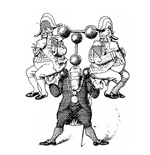
The Originating Judgment of the Culture of Death
IS THE HUMAN PERSON A 'RATIONAL ANIMAL'?
“What is the starting point?” A professor in my college class on the history of philosophy asked this question every time we began to discuss a different philosopher’s views. If we, the students, could identify the opening judgment or first premise a particular philosopher used to begin his logically consistent thinking, we would be able to see why he thought the way he did and how he reached his final conclusion.
We should ask the same question about the starting point of what has come to be known as the “Culture of Death.” If we could identify its originating judgment, we could more easily change this culture by replacing what drives it toward its chilling conclusions.
Quite possibly, the first thing that would come to mind about the starting point of our collapsing culture is the loss of its connection with God. Why would a formerly Christian culture disconnect from the devotional beliefs and practices that held it well above the sinkholes below? There must have been a weak spot in its upward relationship with God.
According to the Book of Genesis, we are made in the image and likeness of God. No weak spot there. According to St. Thomas Aquinas, we are not only likenesses of God, but also rational animals. The first of these ideas is person-based; the second, biology-based. The latter idea originated with Aristotle, who obviously knew nothing about the creation account recorded in Genesis.
You May Also Enjoy
When elites ignore the sublime Judeo-Christian doctrine that each individual is made in the image of God, then scientism and cults like eugenics flourish.
Wide-scale prenatal screening procedures brought about a “free-fire zone” on the defective child throughout all three stages of gestation.
Legions of doctors, health agencies, judges, lawyers, and reporters colluded to keep his case from doing any real damage to the abortion establishment.

